Why HR processes are under the microscope in psychosocial hazard cases
SHARE THIS ARTICLE

In an era where mental health is finally receiving the attention it deserves, businesses cannot afford to let their HR processes fall behind, writes Raechel Gavin.
Since work health and safety (WHS) laws introduced the requirement to manage psychosocial hazards last year, the relationship between HR processes and psychosocial hazard claims continues to face increasing scrutiny. Particularly, a noticeable pattern has emerged in recent psychosocial hazard cases where HR processes are either breaking down or failing to identify these risks before they escalate into serious issues. The role of HR in safeguarding employee wellbeing is critical, and yet, in too many instances, the systems designed to prevent psychosocial harm are proving inadequate.
When we examine psychosocial hazard claims brought against businesses, we often find that the root causes are not always obvious or straightforward. Unlike physical hazards, psychosocial risks are multifaceted and can be difficult to detect early. However, what is becoming clear is that many of these cases could have been mitigated or avoided altogether if robust HR processes were in place.
The complexity of psychosocial risk
Psychosocial risks within the workplace are far from linear. Multiple factors can contribute to a work environment where psychosocial hazards are more likely to arise. For instance, poor leadership, which fails to promote transparency, support, and fairness at the executive level, can create a negative culture that trickles down the organisation. Without strong leadership, HR processes can struggle to gain traction or be perceived as lacking credibility.
A lack of co-worker support can also lead to feelings of isolation and stress, which HR processes may not always detect until it’s too late. Similarly, poor organisational justice – where employees perceive unfairness in how decisions are made or disputes are handled – can foster resentment and disengagement. All of these factors can build up over time, leading to complaints and burnout, and may culminate as psychosocial hazards.
A breakdown in HR processes in such cases is not just about failing to identify risks but also about missed opportunities to intervene early. If complaints are raised but not addressed, or if employees do not feel supported, the problem intensifies. Ultimately, this failure can expose businesses to legal risks and damage their reputation.
Proactive strategies to mitigate psychosocial risk
The good news is that there are ways businesses can proactively mitigate these risks. First and foremost, it is essential to upskill HR teams. The role of HR has evolved dramatically, particularly in the face of modern challenges such as remote work, shifting mental health expectations, and more complex workplace dynamics. HR professionals should be equipped with the knowledge and tools to address psychosocial hazards effectively. Upskilling in areas like conflict resolution and risk management will enable HR teams to respond promptly and appropriately when issues arise.
It is also important to put clear, well-defined processes in place to deal with psychosocial risks. HR teams need tools that enable them to support employees who are navigating these hazards. Whether it is a designated mental health resource, access to employee assistance, or training for managers on identifying signs of stress, the more prepared HR teams are, the less likely issues will snowball into major problems.
A crucial step is to review the relevant codes of practice for your state or territory. Each jurisdiction may have specific requirements around managing psychosocial risks, and it’s important to understand what’s legally required. This includes building a risk register that outlines potential psychosocial hazards and assessing these risks regularly. Many states and territories have templates available through their regulators to help organisations get started with this process. These risk registers should be seen as living documents – ones that evolve as new risks are identified and as the workplace environment changes. These considerations are contemplated in Sonder’s recent guide to managing psychosocial risk management; however, it is important that you remain up to date with the relevant codes in your state or territory.
To begin, businesses should prioritise taking action without being overly concerned about having a flawless framework in place initially. It is far better to start addressing psychosocial hazards with an imperfect plan rather than to wait for the “ideal” solution and leave employees exposed. A flexible, evolving approach is key, and businesses should expect to refine and improve their processes over time.
The importance of a systematic approach
Organisations must have a comprehensive and systematic understanding of where psychosocial risks exist in the workplace. A piecemeal approach is insufficient. Businesses must demonstrate that they have objectively evaluated these risks and implemented a framework to mitigate them. This is not only a legal imperative but also a moral one. When employees feel psychosocially safe, they are more engaged, productive, and committed to the organisation.
In an era where mental health is finally receiving the attention it deserves, businesses cannot afford to let their HR processes fall behind. By investing in upskilling, implementing robust processes, and building a comprehensive risk framework, organisations can protect both their employees and their reputation. HR processes are the frontline defence in ensuring psychosocial safety, and it is time they were treated as such.
Raechel Gavin is the chief people officer at Sonder.
